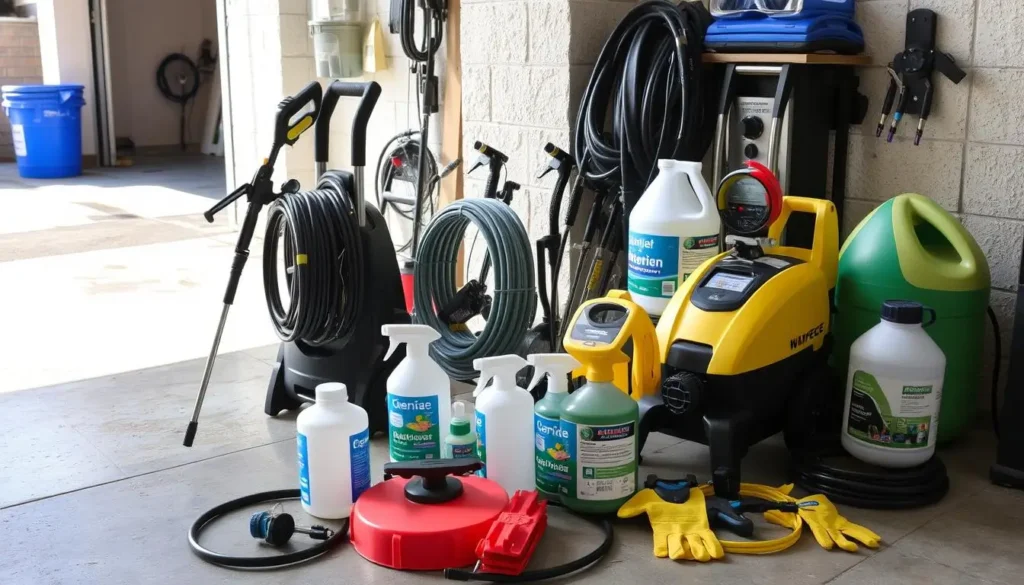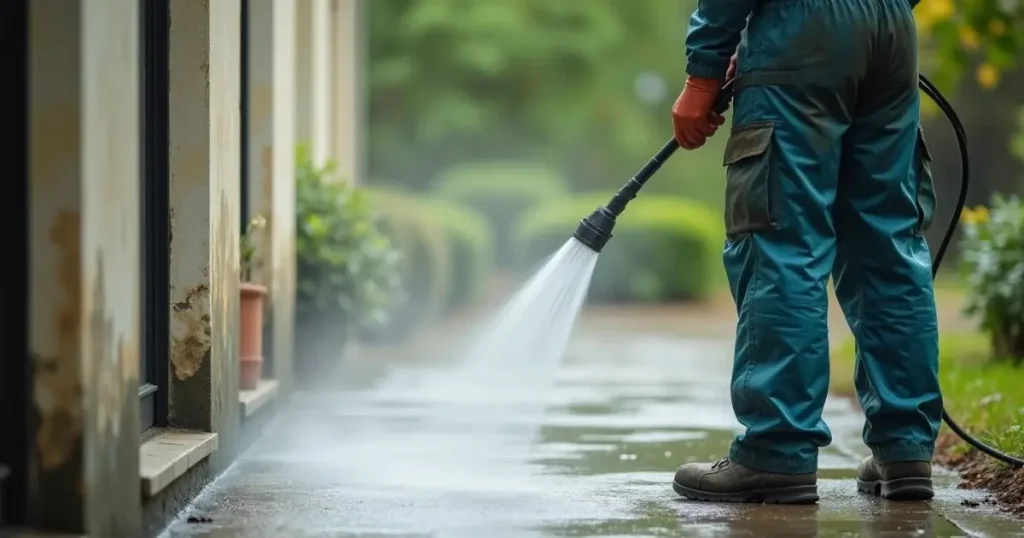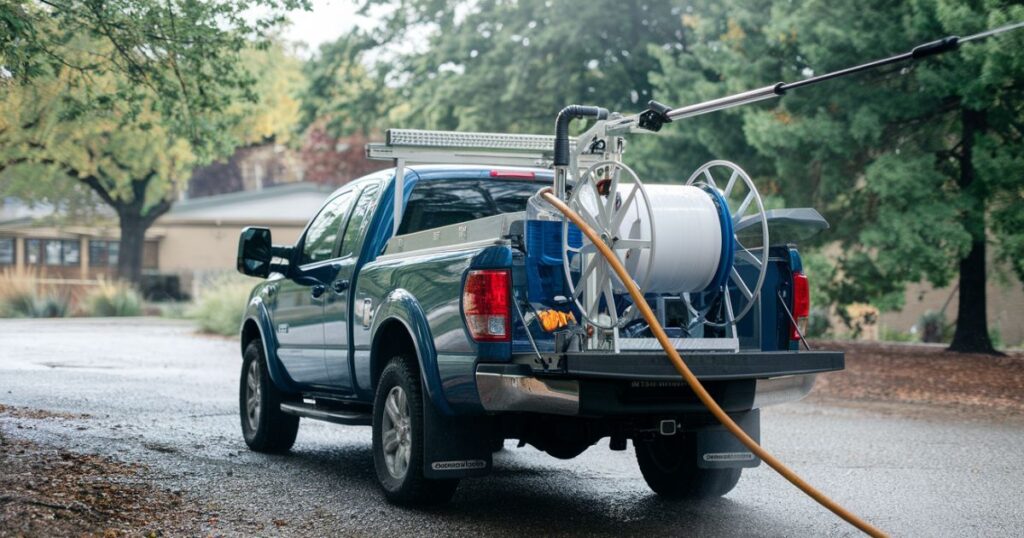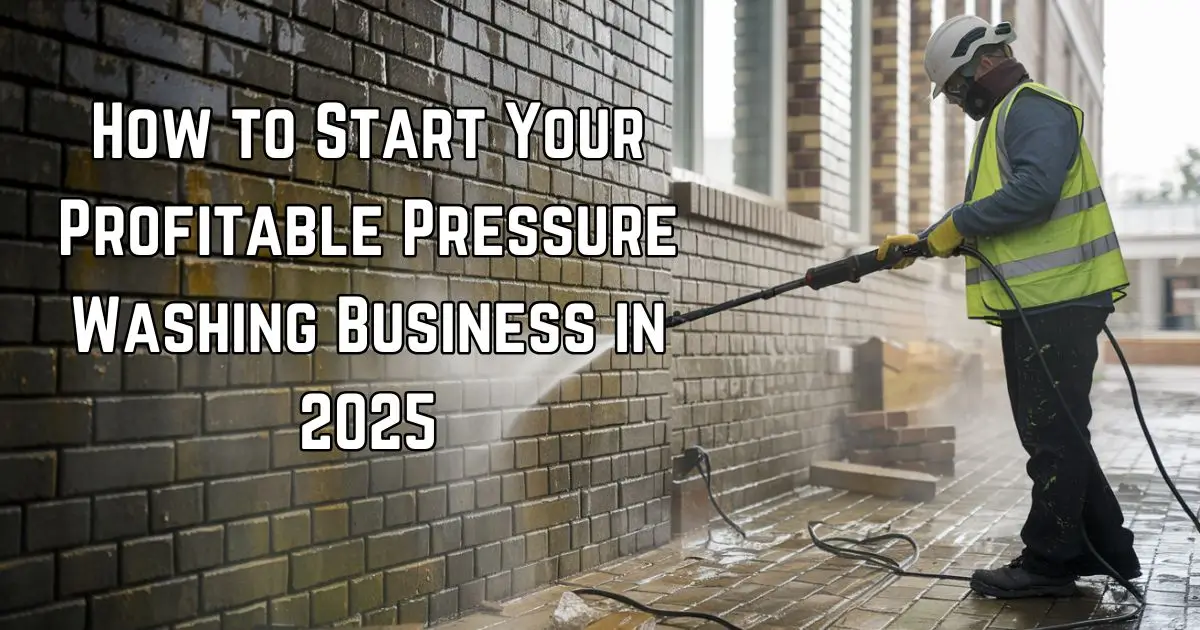The pressure washing business isn’t just about removing dirt—it’s a rapidly growing industry with significant potential. With revenues projected to hit $3 billion by 2026 and a growth rate of 4.2% annually, the numbers speak for themselves. This is more than a passing trend; it’s a genuine opportunity. The U.S. market alone has grown steadily, with specialized cleaning services driving demand year after year.
Here’s an exciting trend: electric pressure washers are gaining traction and are projected to hit $2 billion in sales by 2030. The reason? A rising interest in eco-friendly solutions. Meanwhile, Europe is leading the charge, with its pressure washing market valued at over $1.5 billion in 2023, fueled by booming construction and hospitality sectors.
But don’t be mistaken pressure washing business is competitive. Over 32,000 U.S. employees earn an average of $27 an hour, showing there’s plenty of room for skilled professionals. With global revenues expected to surpass $4 billion by 2030, the time to carve your niche in this thriving industry is now.
Ready to dive into this lucrative world? Let’s explore the strategies to set your pressure washing business up for success.
Table of Contents
8 Steps To Start a Pressure Washing Business
Starting a pressure washing business can be an incredibly rewarding venture, especially with the industry growing at a steady pace. But before you dive in, there are key steps to take to ensure your success. Let’s break them down.
1. Establish a Business Structure
Selecting the appropriate business structure is essential as it impacts your taxes, liability, and overall operations. Here’s a breakdown of the common options:
- Sole Proprietorship: This is the simplest structure, where you are the business. It’s easy to set up and requires minimal paperwork, but it offers no personal liability protection. If you’re starting small and testing the waters, this could be a good option, but you’re personally responsible for any debts or legal issues.
- Limited Liability Company (LLC): An LLC provides personal liability protection, which is essential in a business like a pressure washing business where property damage or accidents can happen. It’s more complex than a sole proprietorship but offers tax flexibility and protects your assets.
- Corporation: A corporation is a distinct legal entity, which means it can own assets, take on liabilities, and enter into contracts independently of its owners. It offers the highest level of protection but also involves more regulatory requirements. Corporations are ideal if you plan to scale or seek outside investment, but they come with additional paperwork and potentially higher taxes.
Once you’ve chosen your structure, file the necessary paperwork with your state and get your business license. In some areas, you may also need specific permits for environmental or water usage regulations.
2. Obtain Necessary Equipment
The equipment you use will directly impact the quality of your service. Here’s a breakdown of what you’ll need to get started:

- Pressure Washer: This is the heart of your pressure washing business. Pressure washers are available in both gas-powered and electric models. Gas washers are more powerful and suitable for heavy-duty work, while electric ones are quieter and more eco-friendly, ideal for smaller residential jobs.
- Surface Cleaners: These help distribute the pressure evenly across large flat surfaces, making your job faster and more efficient. They come in different sizes, so choose one based on the scale of the jobs you plan to take on.
- Hoses and Nozzles: Having a variety of nozzles (like fan, zero, or turbo nozzles) gives you flexibility to adjust the pressure based on the surface. Ensure you have durable hoses that can handle high pressure.
- Chemicals and Cleaners: Depending on the job, you may need cleaning solutions like degreasers, detergents, or eco-friendly cleaners. Some jobs, like oil stain removal, require specialized chemicals.
- Transportation: A dependable vehicle is essential for safely transporting your equipment to job sites. It doesn’t have to be a massive truck at first, but it should have enough space for your gear and be capable of carrying the pressure washer securely.
Tip: Consider renting equipment at first to reduce initial costs. You can test the waters, and once you’re sure this is the right business for you, invest in higher-quality, long-term equipment.
You can also read: Mobile Car Wash Business: Your Complete 2025 Blueprint for Success
3. Research the Industry
Understanding the landscape of your local market is key to pricing and competition.
- Local Demand: Research the specific needs of your area. Are there many homes with driveways that need cleaning? What about commercial properties with large exterior spaces? Identify your target market—residential, commercial, or both—and tailor your services accordingly.
- Competitor Analysis: Look at other pressure-washing businesses in your area. What services are they offering? How much are they charging? What’s their reputation like? Use this information to position your services uniquely—whether through lower pricing, more comprehensive services, or exceptional customer care.
- Profitability: Calculate your potential expenses and expected revenue. You’ll need to account for equipment, cleaning supplies, transportation, marketing, insurance, and business licenses. Research the typical pricing for services like driveway cleaning, roof cleaning, or graffiti removal to estimate what you can earn.
Tip: Keep an eye on seasonal fluctuations. Some areas may see more demand during certain times of the year (spring cleaning, post-storm cleanups, etc.), so adjust your services and marketing accordingly.
4. Set Your Rates
Determining how much to charge is a critical step in setting yourself up for success.
- Pricing Models: The two most common ways to charge are by square footage or hourly rate. If you’re pricing by square footage, ensure you have a clear formula to measure areas (e.g., by foot or square meter). For hourly rates, consider your time, travel, and overhead costs.
- Consider Market Conditions: Research what others in your area are charging. If your rates are too high, you may struggle to attract customers, but if they’re too low, you might not be able to cover your costs. Aim for a balance where your pricing reflects the quality and value you provide.
- Specialized Services: Some services, like roof cleaning or rust removal, can be priced at a premium due to their complexity. Charge accordingly for these more specialized tasks.
Tip: Offer tiered pricing based on the complexity of the job. For example, a basic driveway cleaning might have a fixed price, while a roof cleaning or deck restoration could have a higher rate.
5. Set Up Banking and Payment Processing
For a smooth operation, separate your personal and business finances.
- Business Bank Account: Open a separate business account for income and expenses. This makes it easier to track profits and losses and simplifies tax preparation.
- Payment Processing: Set up a reliable payment system that can handle both credit and debit card transactions. Offering payment options like credit cards, PayPal, or even mobile payments will make it easier for clients to pay you.
- Invoicing: Use invoicing software or apps that allow you to create professional invoices for each service. Many tools also allow for automated reminders to ensure clients pay on time.
Tip: Consider offering discounts for early payments or package deals for recurring services to improve cash flow.
6. Market Your Business
Marketing is crucial for attracting new clients and building a long-term business.
- Build an Online Presence: Create a professional website that includes your services, pricing, and contact information. A website that’s well-designed and informative can make a big impact on potential clients.
- Social Media: Build your presence on platforms such as Instagram, Facebook, and LinkedIn. Showcase before-and-after photos, customer testimonials, and live demonstrations to engage with your audience.
- Local SEO: Set up your Google My Business profile and actively encourage happy clients to leave glowing reviews. These reviews are critical for establishing credibility, especially in a competitive local market.
- Referral Programs: Word of mouth is powerful in service-based businesses. Provide incentives, such as discounts or complimentary services, to customers who refer their friends and family to your business.
Tip: Running promotions or introductory offers can help attract your first customers. Think about offering a discount on a specific service for the first month to get the word out.
7. Provide Excellent Customer Service
Customer service will make or break your business, so focus on delivering an exceptional experience every time.
- Communication: Be clear and timely in all communications. Respond to inquiries quickly, provide clear estimates, and keep clients updated about scheduling and delays.
- Reliability: Show up on time and complete the job as promised. This fosters trust and encourages repeat business.
- Follow-Up: Once the job is complete, make sure to reach out to your clients. Ask them for feedback, thank them for their business, and offer additional services like regular cleanings or seasonal treatments.
Tip: Set up a customer relationship management (CRM) system to keep track of clients, manage follow-ups, and monitor feedback.

8. Expand Your Services
As your business expands, think about diversifying your offerings to boost revenue.
- New Service Offerings: Think about adding window washing, gutter cleaning, or roof treatments to your list of services. These can increase your average ticket price and attract a wider customer base.
- Commercial Clients: Once you’ve built a solid residential base, consider targeting commercial properties. Businesses, parking lots, and office buildings often need pressure washing, and the contracts can be much larger.
- Partnerships: Collaborate with local businesses, like property managers or real estate agents, who can refer clients to you.
Tip: Don’t just add services—promote them effectively. Bundle services for discounts or offer seasonal deals to make them irresistible.
By following these detailed steps, you’ll be well on your way to running a successful pressure-washing business!
You can also read: Street Sweeper Success: Brandon’s $1M Business Journey
Getting Your First Pressure Washing Client
Securing your first client is a huge milestone in any new business, especially in the pressure-washing business, where reputation and trust are key. Let’s break down some powerful strategies to land those initial jobs and start building momentum.
Tap Into Your Network: Friends and Family
Reach out to friends and family—they’re often eager to support you as you start your business. Ask if they need any services around the house: driveway cleaning, roof washing, or patio pressure washing. It’s a great way to get started without feeling pressure to find paying clients right off the bat.
Pro Tip: If your spouse is willing, they could even help you with the work during your first year. Not only does this help you gain experience, but it also keeps costs down while you establish your business.
Offer Free Cleanings in Exchange for Reviews and Testimonials
Building an online reputation early is critical in the pressure washing business. Offering a few free cleanings in exchange for customer reviews is an excellent way to build credibility and social proof. Once you’ve completed a job, ask clients for testimonials and permission to share before-and-after photos on your website and social media.
Pro Tip: These testimonials and photos will not only build trust but also act as the foundation for your marketing materials. Positive reviews can be the tipping point for potential paying clients looking for a reliable service.
Target Your Local Neighborhood
Begin by focusing your marketing efforts on your neighborhood. Introduce yourself in person or leave flyers and business cards at local stores. If you’re not sure where to start, post in local Facebook groups or neighborhood platforms like Nextdoor. These platforms are great for connecting with potential clients who live nearby and need services.
Pro Tip: Consider offering a small discount to customers who let you place a yard sign in front of their home after a cleaning job. It’s free advertising that can lead to more local business and give you visibility in your area.

Offer a Special Deal on a Specific Service
Everyone loves a good deal, and offering a special promotion on a specific service can be a great way to get your foot in the door. Consider discounting common services like driveway cleaning, which can be both high in demand and easy to perform. Once you’ve built trust with the client by doing a quality job, you can upsell them on other services like house washing, roof cleaning, or gutter cleaning.
Pro Tip: Start with lower-risk services like a trash can cleaning or patio cleaning. These tend to have a lower price point, so customers are more willing to take a chance on you. Use these smaller jobs as stepping stones to secure bigger, more profitable contracts down the road.
Partner with Other Local Businesses
Local businesses can be a valuable referral network. Real estate agents, home stagers, landscapers, and contractors all need reliable pressure washing businesses to recommend to their clients. Approach these professionals with an offer: you’ll provide discounted services in exchange for their referrals.
Pro Tip: Build strong relationships by offering reliable, high-quality service, and don’t be afraid to ask for referrals. The more trusted partners you have, the more leads you’ll receive—and the faster your pressure-washing business will grow.
Final Thoughts
Starting a pressure washing business offers a promising opportunity, but success requires more than just the right equipment and a willingness to work hard. By following the steps outlined in this guide, from selecting a business structure to providing excellent customer service, you’ll be well on your way to building a solid foundation. Keep in mind that ongoing research, effective marketing, and smart pricing strategies are essential for staying competitive in this growing industry. As you expand your services and build your reputation, remember that quality, reliability, and customer satisfaction will be the key drivers of long-term success. With the right approach, you can turn your pressure-washing business into a profitable and sustainable venture.

